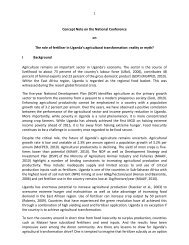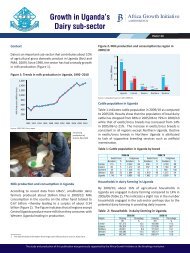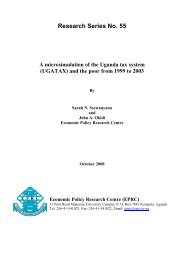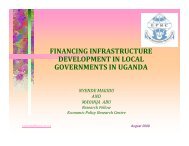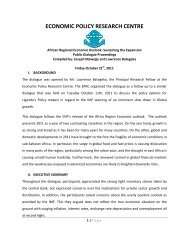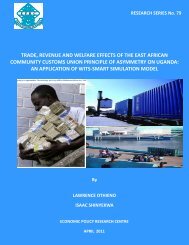The Political Context of Financing Infrastructure Development in ...
The Political Context of Financing Infrastructure Development in ...
The Political Context of Financing Infrastructure Development in ...
You also want an ePaper? Increase the reach of your titles
YUMPU automatically turns print PDFs into web optimized ePapers that Google loves.
<strong>The</strong> <strong>Political</strong> <strong>Context</strong> <strong>of</strong> <strong>F<strong>in</strong>anc<strong>in</strong>g</strong> <strong>Infrastructure</strong> <strong>Development</strong> <strong>in</strong> Local Government<br />
through democratic elections. <strong>The</strong> spr<strong>in</strong>g board <strong>of</strong> the localist theory is to stem <strong>of</strong>f central<br />
government control <strong>of</strong> local authorities that may not fully implement its policies even if<br />
they are contrary to priorities <strong>of</strong> the local authority. Thus, the ma<strong>in</strong> argument <strong>of</strong> the localist<br />
theory is that s<strong>in</strong>ce local government is democratically elected, it should have a high degree <strong>of</strong><br />
autonomy to decide its priorities. <strong>The</strong> argument <strong>of</strong> this paper is that with such autonomy, local<br />
governments can take charge <strong>of</strong> <strong>in</strong>frastructure development and exercise over sight functions<br />
while they have decentralized or devolved powers.<br />
<strong>The</strong> prime movers <strong>of</strong> the localist theory were Jones and Stewart (1985), while others such<br />
as Stoker (1996, 1988) followed suit. In defence <strong>of</strong> local autonomy and local government<br />
these localist theorists developed what Stoker (1996) refers to as orthodox arguments <strong>in</strong> a<br />
range <strong>of</strong> ways. Foremost among these is diffusion <strong>of</strong> power. This is a fundamental value and<br />
elected local authorities can represent the dispersion <strong>of</strong> legitimate political power <strong>in</strong> society.<br />
In this regard, the localists object local government under deconcentration 1 and advocate for<br />
autonomous local governments with devolved powers. To contextualise this, it is important<br />
to note that it is such local governments that can be responsible for f<strong>in</strong>anc<strong>in</strong>g <strong>in</strong>frastructure<br />
development while the Local Councils exercise oversight functions.<br />
<strong>The</strong> second argument h<strong>in</strong>ges on the diversity <strong>of</strong> needs. This presupposes that needs, wishes<br />
and concerns <strong>of</strong> people vary from locality to locality. Local governments should therefore<br />
allow these differences to be accommodated. This implies that each local government should<br />
set priorities <strong>in</strong> its area <strong>of</strong> jurisdiction <strong>in</strong> accordance with needs <strong>of</strong> its people or community<br />
demands.<br />
<strong>The</strong> third argument <strong>of</strong> the localist theory is that local government is local. To the localists, this<br />
facilitates accessibility and responsiveness because the elected <strong>of</strong>ficials (councillors) and the<br />
technical staff live close to the decisions they make and the areas whose environment they<br />
shape. <strong>The</strong> fourth argument revolves around the size <strong>of</strong> local government. <strong>The</strong> localists argue<br />
that the small scale <strong>of</strong> local government makes it more subject to demands to be accountable<br />
by both the local councils and the central government which provides most <strong>of</strong> the funds. A local<br />
government is visible and open to pressure when it fails to meet the needs <strong>of</strong> citizens under its<br />
jurisdiction. A local government makes a government less remote and more manageable. It<br />
makes it more comprehensible and enables a clear and balanced choice to be made over the<br />
extent to which people wish to promote community values.<br />
While the localist theory which forms the framework <strong>of</strong> analysis <strong>in</strong> this paper rests on a pluralist<br />
approach to understand<strong>in</strong>g the state and politics and recognizes the existence <strong>of</strong> diversity <strong>in</strong><br />
social, <strong>in</strong>stitutional and ideological practices and values, this paper adds another dimension.<br />
1 Deconcentration is the transfer <strong>of</strong> functions and responsibilities to lower adm<strong>in</strong>istrative units manned by centrally appo<strong>in</strong>ted <strong>of</strong>ficials,<br />
who implement def<strong>in</strong>ed functions under central control.<br />
4<br />
Economic Policy Research Centre - EPRC






